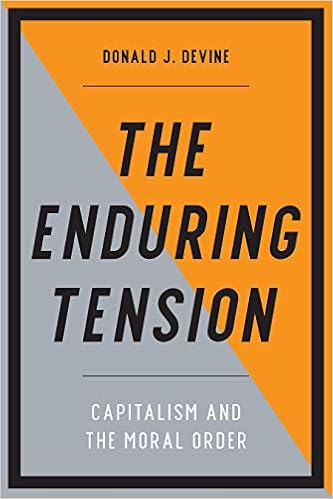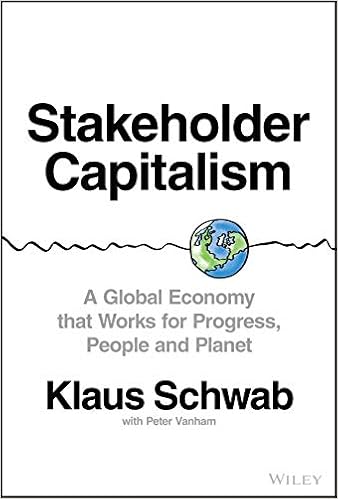Book Bits: 5 Brand New Books, One Recent
 ● The Value Investors: Lessons from the World’s Top Fund Managers (2nd ed.)
● The Value Investors: Lessons from the World’s Top Fund Managers (2nd ed.)
Ronald Chan
Summary via publisher (Wiley)
The second edition of The Value Investors presents a collection of investing legend profiles from around the world. Chapters explore the investors’ backgrounds, cultures, and personal stories, and reveal how life experiences have shaped their investment strategies and mindsets. This fascinating book shows you that value investing is a dynamic, constantly-changing strategy which, when properly implemented, can provide significant, sustainable benefits. Although the investors profiled come from a diverse range of geographic regions and socio-economic, cultural, and educational backgrounds, they share similar personality traits, temperaments, and investment philosophes.
 ● The Enduring Tension: Capitalism and the Moral Order
● The Enduring Tension: Capitalism and the Moral Order
Donald J. Devine
Summary via Amazon
Capitalism only survives today in what Schumpeter’s classic Capitalism, Socialism and Democracy called a “fettered” form, harnessed by bureaucratic regulations that impede productivity, compound the problems they were designed to fix, and dissolve the moral structure that underlay capitalist civilization’s creativity and moral legitimacy. A response to these challenges must begin with capitalism’s defining author Karl Marx accurately setting capitalism’s roots in feudalism and the implications of that historical inheritance, predominantly what Walter Lippmann identified as Rousseau’s “Christian heresy.” That revolution converted heavenly perfection into impossible to fulfill demands on earth, culminating in what F.A. Hayek considered the “superstition” that science could rationalize markets to achieve social perfection.
 ● Mistrust: Why Losing Faith in Institutions
● Mistrust: Why Losing Faith in Institutions
Provides the Tools to Transform Them
Ethan Zuckerman
Review via New York Times
In his new book, “Mistrust,” Ethan Zuckerman takes us on a kaleidoscopic tour of everyone from Gandhi to Bitcoin enthusiasts, Brexit voters to Black Lives Matter activists — people and groups whom he calls “insurrectionists” because they are trying to overthrow or work around what has been a worldwide decline in social trust. Fighting this erosion from another direction are the “institutionalists,” those who seek to bolster trust and prevent any further crumbling.
 ● Stakeholder Capitalism: A Global Economy that Works for Progress, People and Planet
● Stakeholder Capitalism: A Global Economy that Works for Progress, People and Planet
Klaus Schwab with Peter Vanham
Summary via publisher (Wiley)
Our global economic system is broken. But we can replace the current picture of global upheaval, unsustainability, and uncertainty with one of an economy that works for all people, and the planet. First, we must eliminate rising income inequality within societies where productivity and wage growth has slowed. Second, we must reduce the dampening effect of monopoly market power wielded by large corporations on innovation and productivity gains. And finally, the short-sighted exploitation of natural resources that is corroding the environment and affecting the lives of many for the worse must end.
● Big Data Science in Finance
Irene Aldridge and Marco Avellaneda
Summary via publisher (Wiley)
Data science has fundamentally changed Wall Street—applied mathematics and software code are increasingly driving finance and investment-decision tools. Big Data Science in Finance examines the mathematics, theory, and practical use of the revolutionary techniques that are transforming the industry. Designed for mathematically-advanced students and discerning financial practitioners alike, this energizing book presents new, cutting-edge content based on world-class research taught in the leading Financial Mathematics and Engineering programs in the world. Marco Avellaneda, a leader in quantitative finance, and quantitative methodology author Irene Aldridge help readers harness the power of Big Data.
[and new from Oct. 2020...]
● The Inflation Myth and the Wonderful World of Deflation
Mark Mobius
Summary via publisher (Wiley)
The Inflation Myth and the Wonderful World of Deflation illustrates our rapidly changing world where constant technological innovation leads to cheaper and better products. These changes are no longer reflected in the ways we measure inflation. Renowned investor and author Mark Mobius persuasively argues that what we believe to know about inflation today does not reflect the reality any longer. It is a myth, a legend, a fable, and, yes, a falsehood for a number of reasons.
Please note that the links to books above are affiliate links with Amazon.com and James Picerno (a.k.a. The Capital Spectator) earns money if you buy one of the titles listed. Also note that you will not pay extra for a book even though it generates revenue for The Capital Spectator. By purchasing books through this site, you provide support for The Capital Spectator’s free content. Thank you!
Disclosure: None.



